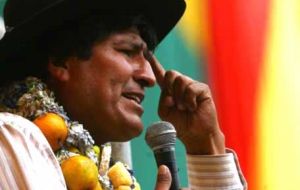MercoPress. South Atlantic News Agency
Bolivian president Morales launches the “indigenous autonomy”
 Peasant and indigenous communities will be entitled to vote for more autonomy in referendums next December, an issue that has bitterly divided the country.
Peasant and indigenous communities will be entitled to vote for more autonomy in referendums next December, an issue that has bitterly divided the country. Bolivia has become the first country in the history of South America to declare the right of indigenous people to govern themselves. The country's first indigenous president, Evo Morales, launched his so-called “indigenous autonomy” policy in the eastern lowlands.
Peasant and indigenous communities will be entitled to vote for more autonomy in referendums next December.
The provisions are contained in a constitution passed earlier this year. The new charter was bitterly opposed by Bolivia's traditional elite.
On Sunday, the provisions allowing for indigenous autonomy were presented in a special event in the eastern region of Santa Cruz.
Morales said it was “a historic day for the peasant and indigenous movement”.
“Your president, your companion, your brother Evo Morales might make mistakes but will never betray the fight started by our ancestors and the fight of the Bolivian people,” he said.
Morales has championed Bolivia's indigenous people, who for centuries were banished to the margins of society. Indigenous groups have increasingly seized political control, transforming the country into a 21st Century standard bearer for South America's native populations.
But many opposed to Morales and the new constitution believe he is polarising the country by dividing it along racial lines. The referendums in December will be held alongside Bolivia's presidential and parliamentary elections. (BBC)




Top Comments
Disclaimer & comment rulesCommenting for this story is now closed.
If you have a Facebook account, become a fan and comment on our Facebook Page!